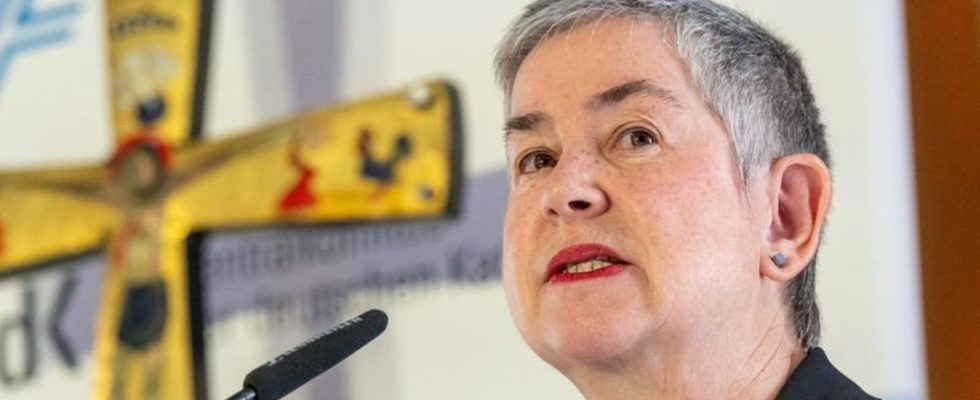Church
Catholic lay president insists on participation
Lay President Irme Stetter-Karp finds it misleading to accuse German Catholics of pushing things forward on their own without coordination with Rome. photo
© Peter Kneffel/dpa
A word of power from the Vatican gives the German bishops the choice of whether to oppose Rome or forego promised reforms. Lay President Stetter-Karp has a clear message.
The ZdK represents practicing Catholics in associations and diocesan councils as well as elected individuals. They are referred to as “laypeople.” As a consequence of the child sexual abuse scandal in the Catholic Church, the ZdK, together with the Bishops’ Conference, initiated a reform process in 2019, the Synodal Way. It is intended to change the structures that promote abuse within the church. One of the central projects in this attempt at renewal is the Synodal Council, in which bishops and laypeople will in future discuss and make decisions together. The bishops retain legal authority over their dioceses, as required by canon law.
Vote removed from the agenda
In order to prepare the Synodal Council, the ZdK and the Bishops’ Conference have founded a Synodal Committee. However, a ratification of the statutes of the Synodal Committee planned for the spring general assembly was effectively blocked by Pope Francis. Three high-ranking Curia cardinals from the Vatican wrote a letter to the German Bishops’ Conference, whereupon chairman Georg Bätzing removed the vote from the agenda.
Stetter-Karp accused the Curia cardinals of drawing distorted images in their letter and treating bishops like schoolboys. It is absolutely misleading to accuse the German Catholics of pushing things forward on their own without coordination with Rome. “We have been trying to have an intensive exchange together with the German bishops for years, but we ZdK representatives have not yet been welcomed to the Vatican for a discussion on this matter.” It is also downright shameful that the cardinals did not mention the trigger for the reform efforts – sexual abuse.
More than 500,000 people left the church in 2022
Stetter-Karp said she expects the German bishops to stick to their promises of reform and not allow themselves to be intimidated. If necessary, the vote on the statutes could also take place in the Permanent Council of the Bishops’ Conference, so that one does not have to wait until the autumn general assembly. “Our interest is not to waste any more time. The ball is now in the German bishops’ court.”
The ZdK president recalled that more than half a million people in Germany would have left the Catholic Church in 2022 alone. The church membership survey published a few months ago showed that 96 percent of German Catholics urgently expected reforms. The blockade by the Vatican authorities is therefore unacceptable and also incomprehensible: “Participation by believers is a resource and not a threat. Our goal is still to shape the future of this church together with the bishops.”

